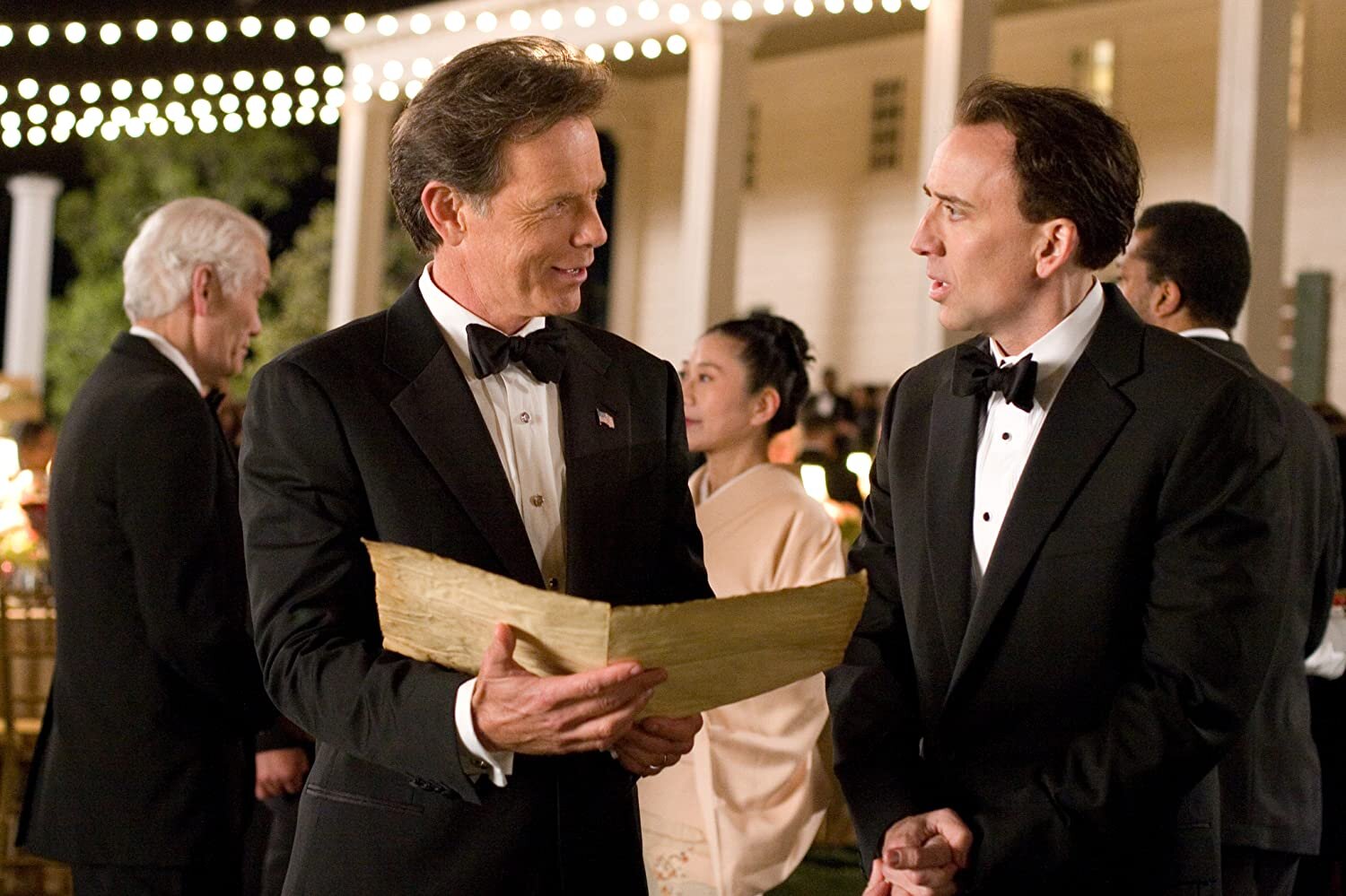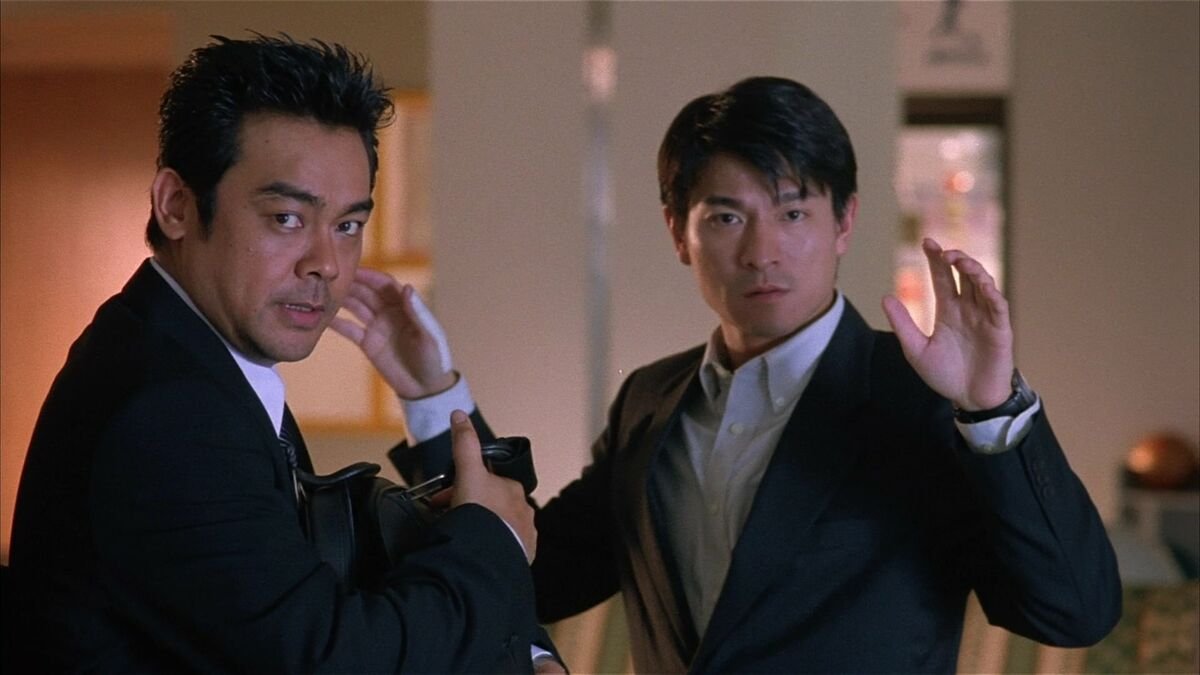Review: National Treasure: Book of Secrets (2007)
National Treasure: Book of Secrets, the 2007 sequel to the surprise 2004 hit starring Nicolas Cage as a treasure hunter, is as nostalgic as films get. Although it was released only 13 years ago, it feels like it was made in another century, with a rose-coloured outlook on not only American history and culture, but the government that leads the nation. To say that people don’t think quite as highly of the US in 2020 as they do in this film would be an understatement. Thus, watching a film like Book of Secrets, which paints the President of the United States as an eminently reasonable man, celebrates the Founding Fathers as semi-divine, and charts its hero’s quest to prove his ancestor was not a traitor, is akin to looking at elementary yearbook photos. Of course, much of this was also the case in the first National Treasure film, but that film didn’t have the President of the United States as a character. Thus, Book of Secrets amplifies everything present in the first National Treasure film, including the nostalgic nationalism.
Book of Secrets picks up a few years after the first film and once again puts Nicolas Cage’s Benjamin Franklin Gates on a treasure hunt, this time for the Native American city of gold, Cibola. Of course, finding this city of gold isn’t the main motivation. By finding the city, Ben can prove that his great-great-grandfather, Thomas Gates, was not a party to the assassination of Abraham Lincoln. Thus, more important than the treasure is Ben’s good name and the honour of a long-dead patriot. In this cinematic universe, it seems that nothing is more important than patriotic honour.
In the lavishly-designed prologue, we watch Thomas Gates (Joel Gretsch) decode a cipher in a diary. The date is April 14, 1865 and the diary happens to belong to John Wilkes Booth (Christian Camargo). Booth proceeds to assassinate Lincoln (which the film depicts, continuing a long American cinematic tradition, going back at least to D.W. Griffith’s infamous The Birth of a Nation) and Gates realizes he was duped, burning the cipher, but not before one of Booth’s compatriots fatally shoots Thomas. Years later in the present, Ed Harris’s black market dealer Mitch Wilkinson smears Thomas’s name by producing a page from Booth’s diary with Thomas’s name listed alongside other traitors.
Ben knows that Thomas burned the cipher to keep it out of the traitors’ hands, but he has to find the treasure and the President’s Secret Book to clear his great-great-grandfather’s name. A treasure hunt ensues, with Ben and his compatriots, including his father Patrick (Jon Voight), estranged girlfriend Abigail (Diane Kruger), and best friend Riley (Justin Bartha), following clues to London, Washington and even George Washington’s plantation home Mount Vernon, where Ben crashes the President’s birthday party (played by Canadian acting icon Bruce Greenwood) and convinces him to tell him where his secret book is, the one with all the answers about the JFK assassination, Area 51, and hidden treasures like Cibola.
Ben has to “kidnap” the President to ask him for help—or so the film’s marketing hook goes—but really he leads him off to a secret hideout beneath the grounds of Mount Vernon where Ben and the President are separated from the Secret Service, making them think Ben has kidnapped him. Bafflingly, the President is game to help Ben, giving him the location of the secret book. With a twinkle in his eye, he tells Ben that he’ll have to say he was kidnapped, but that if Ben finds the treasure, he’ll publicly exonerate him. Because in this universe, the President is not only concerned about family honour, but also happy to let eccentric treasure hunters have a peek at state secrets. What could possibly be the harm?
Such an approach is as childish as it gets, but also sweetly earnest, assuming that all the secrets within the book are esoteric treasure maps and answers about aliens and hidden gold, not admissions about America’s imperial actions over the centuries or confessions about wars and genocides and the like, as it would be in the real world. But such is the world that the National Treasure series operates in. It takes place in a world where the United States is unquestionably the greatest country in the world and there’s no doubting it. Casting Greenwood to embody such decency as the President is a masterstroke, as the actor projects easygoing virtue and honesty. (It also helps that he played John F. Kennedy in Thirteen Days.) There’s an irony, though, that casting a Canadian is necessary to convince audiences of American virtue.
While the plot and thematic interests of Book of Secrets embody this juvenile nationalism, the film has other pleasures to recommend itself. While the treasure hunt itself is not as fun as in the first film, which gets to play with all the Masonic imagery in American landmarks, the performances are doubly fun. Not only do holdovers like Jon Voight and Harvey Keitel seem to be having as much fun as the first time around, but Ed Harris is strangely committed to playing the rival Wilkinson, culminating in a bizarrely stunning act of heroism during the action climax. The filmmakers also spring Helen Mirren as a mid-film surprise as Ben’s English mother, who spars with Voight in the few scenes and provides an extra bit of star power in a film that already boasts an impressive cast.
But most fun is Nicolas Cage, who is unleashed here, no longer simply channeling his insane energy into the goofy charm of Ben Gates, but tapping in his weirdest self in several scenes. In one moment, Ben fakes a fight with Abigail in Buckingham Palace in order to distract the guards, and Cage goes full Cage in his howling, histrionic display, complete with prancing and screaming. It’s a deranged performance and wonderfully odd for a film as square as National Treasure: Book of Secrets.
However, while the actors are having more fun than ever, the filmmaking could be considered a slight downgrade from the first film. While National Treasure had silly CGI and a few too many early-2000s camera whooshes, Caleb Deschanel’s cinematography was warm and gorgeous, painting the whole film as a sepia-toned recreation of an opulent past. The filmmaking here is more workmanlike, starting to tilt towards the medium shot, flatly-lit house style of the 2010s (best exemplified by the MCU), rather than the expressive, robust style of the 1990s.
All told, Book of Secrets is something of a retread, but it contains the same joyous, misguided optimism of the first film, where history is not only full of treasures, but charted by men of great virtue and worth. It’s another nostalgic artifact of a past Hollywood where not only was patriotism a necessary thematic component to Hollywood blockbusters, but an actor as strange as Nicolas Cage could lead a family-friendly adventure franchise. Those certainly were the days.
6 out of 10
National Treasure: Book of Secrets (2007, USA)
Directed by Jon Turteltaub; written by Cormac Wibberley and Marianne Wibberley, based on a story by Gregory Poirer, Cormac Wibberley, Marianne Wibberley, Ted Elliott, Terry Rossio, based on characters created by Jim Kouf, Oren Aviv, Charles Segars; starring Nicolas Cage, Jon Voight, Harvey Keitel, Ed Harris, Diane Kruger, Justin Bartha, Bruce Greenwood, Helen Mirren.



George More O’Farrell’s The Holly and the Ivy is a perceptive Christmas drama that deserves a place in the Christmas rotation.